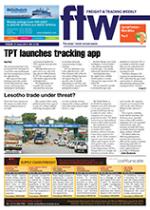Increasing containerisation
of cargo in the West
African market, which is
supported by investment
in container
infrastructure
both inside
and outside the
ports, is not
diminishing the
contribution of
multipurpose
(MPP)
operators,
according
to Pamela
Yerushalmy,
Safmarine
MPV line
manager for the
South Africa-
West Africa
(Safwaf) trade.
“Containers have always
been an important contributor
to our bottom line and form
an integral part of our product
offering into West Africa,
especially for those customers
who prefer to
have containers
shipped directly
into niche
ports,” she says.
“For
example, our
direct product
into Matadi
(at mouth of
Congo River) is
an important
option for
shippers of
containerised
IMO 1 cargo,
and cargo
that does not
accommodate transhipment
dwell times in tropical
conditions very well.”
Multi-purpose operators also
offer the convenience and peace
of mind of shipping multiple
consignments (both breakbulk
and containers) under one bill
of lading and on a single vessel,
she added.
“These multiple
consignments are often made
up of a number of pieces in
varying shapes and sizes and
many shippers prefer the
security of shipping these
items together on one vessel.
The possibility of shipping
multiple consignments helps to
limit risk, assists in reducing
downtime and can reduce cost
and administration time at
both ends,” says Yerushalmy.
These include cargoes such
as tanks for the oil and gas
industry or machinery for
the mining industry which
are shipped as breakbulk
together with smaller items
(spare parts for new or current
consignments, pre-fabricated
modules and tools) that can be
consolidated into containers,
she added. “This ensures the
entire consignment arrives
at the final destination
simultaneously.”
Safmarine MPV’s Cape
Town-based owner’s
representative, James Lewer,
points out that multi-purpose
operators usually deploy
self-geared vessels, reducing
exposure to equipment
breakdowns at the ports
during container load and
discharge operations. “For us
the operation of containers
also means increased deck
utilisation and relatively quick
operational productivity,
which all helps in reducing our
cost base."
He says there's also been
positive feedback from
customers for berthing at
alternative multipurpose
terminals in South Africa.
“These terminals tend to have
lower traffic, less frequent instances
of trucking and berthing congestion
and importantly, the multi-purpose
terminal gives customers more choice.
“In addition, the nature of our
service allows us to serve ports that are
not regularly served by the container
carriers, for example, Port Gentil or Sao
Tome, which adds to the options.”
Although container operators have
the advantage of offering more frequent
sailings into West African container
ports, Lewer says feedback from
customers has indicated that “frequency
is seemingly not the ‘be-all and end-all’
of the container market from South
Africa into West Africa and that choice
of product is valued.
“While it is possible that the ongoing
containerisation of Africa could result
in multi-purpose operators losing
some of their business to container
carriers, we believe that by offering
the marketplace a regular and reliable
service there’s still plenty of cargo left to
develop and carry."
INSERT & CAPTION 1
Containers have
always been an
important contributor
to our bottom line
and form an integral
part of our product
offering into West
Africa.
– Pamela Yerushalmy
INSERT & CAPTION 2
The nature of our
service allows us to
serve ports that are
not regularly called
by the container
carriers, for example,
Port Gentil or Sao
Tome, which adds to
the options.
– James Lewer
CAPTION
Multimodal vessels keep trade moving to the African west coast.

